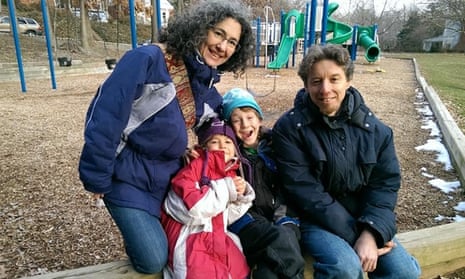On a Saturday afternoon in December, a 10-year-old boy and his six-year-old sister were brought to their home in suburban Maryland in a police patrol car. The officers informed their father, Alexander Meitiv, a physicist at the National Institutes of Health, that the children had been found walking the streets of Silver Spring unsupervised.
Meitiv, however, already knew this – it was he who had let them walk home from the local park, with the understanding they would return at an agreed time. The police didn’t like this explanation, and an hour later Meitiv found himself faced with a child protective services (CPS) officer threatening to take the kids away.
By February, Meitiv and his wife, Danielle, were found responsible for a form of child neglect by the state of Maryland.
“We got this form letter last week that said in nice big capital letters, ‘You have been found responsible for unsubstantiated child neglect,’” Meitiv told the Guardian by telephone. “As a parent you try so hard to do what’s best for your kid, you put so much energy and emotion into raising them, only to have a government agency come in with a silver pen and judge you for negligence.”
Maryland’s CPS, which administered the investigation, based the decision on an interpretation of a law regarding the supervision of children, which says that children under the age of eight cannot be left home alone.
The law, however, does not discuss the specifics of outdoor spaces and parks. And the Meitivs’ case has shone a harsh light on vague laws intended to safeguard children but which end up resulting in unintended consequences.
“The only people who have threatened to abduct my kids are the child protective services,” Danielle Meitiv remarked. She said her children have suffered nightmares about the police taking them away and arresting their father.
The Meitivs subscribe to a parenting practice known as the free-range kids movement. It was started by Lenore Skenazy in 2008 after she wrote a newspaper column about allowing her nine-year-old son to ride the New York subway alone. The piece sparked outrage, with critics hailing her as a child abuser and calling for her arrest for child endangerment.
“I’m actually a nervous mom,” Skenazy said. “I love safety and helmets and car seats and seat belts, but I just don’t think kids need a security detail every time they leave the house.”
The free-range kids movement is based on the belief that giving children independence, instead of “helicopter parenting” them, is a healthier approach to child-rearing. “This isn’t some crazy, newfangled movement – this is how parents have raised children for generations,” Danielle Meitiv said.
“This country has become a land of snitches, where anybody who sees a child doing anything they think might a little bit dangerous turns in their neighbour,” Skenazy said. “They think they’re being a good samaritan.”
Following the response to her original column, Skenazy started a blog and went on to write a book and host a reality TV show about the importance of giving children a sense of independence and raising them in a way that allows them the freedom to play outside without adults around. In doing her work, she said she unearthed an obvious pattern of government intrusion on parenting decisions.
Skenazy said she has received hundreds of messages from parents who, like the Meitivs, have found themselves being penalised by law enforcement agencies for allowing their children to play outside or walk home alone.
“There really is a deep but misguided belief that our children are in real danger,” Skenazy said. She points out that kidnappings in broad daylight are extremely rare. According to the Polly Klaas Foundation, a children’s safety nonprofit, the number of children snatched each year by complete strangers is 100, of which approximately half are returned unharmed. The majority of kidnappings are carried out instead by family members, often those involved in a custody dispute.
The Meitivs said they have no plans to change their behaviour, but they are concerned about what will happen next. The CPS told the family the investigation is now closed, but the finding of unsubstantiated neglect will be on file for the next five years.
“In short, a finding of ‘unsubstantiated’ is legal purgatory,” Matthew Dowd, the family’s lawyer said. “It’s a bizarre finding where the agency neither rules out neglect nor finds actual neglect. It also creates an unfair cloud over the Meitivs.”
Dowd is concerned by the lack of clarity the CPS has provided his clients. “CPS has already threatened to remove the children from their parents. This is a serious abuse of bureaucratic power, all in the absence of any evidence that the children were in substantial risk of harm.”

Comments (…)
Sign in or create your Guardian account to join the discussion